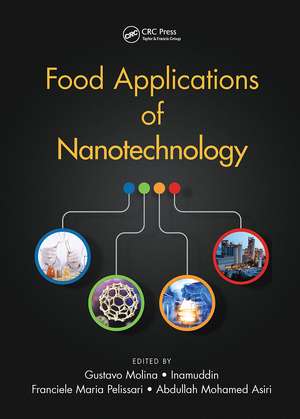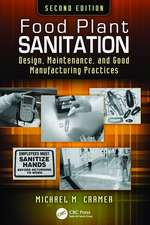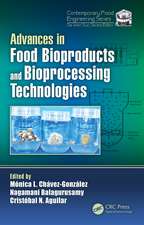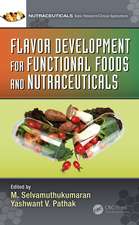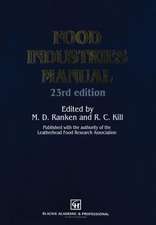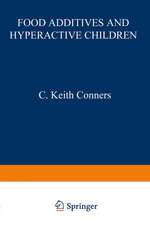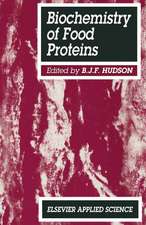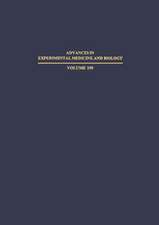Food Applications of Nanotechnology
Editat de Gustavo Molina, Inamuddin, Franciele Maria Pelissari, Abdullah Mohamed Asirien Limba Engleză Hardback – 11 sep 2019
Food Applications of Nanotechnology presents the main advances of nanotechnology for food industry development. The fundamental concepts of the technique are presented, followed by examples of application in several sectors, such as the enhancement of flavor, color and sensory characteristics; the description of the general concepts of nano-supplements, antimicrobial nanoparticles and other active compounds into food; and developments in the field of packaging, among others. In addition, this work updates readers on the industrial development and the main regulatory aspects for the safety and commercialization of nanofoods.
Features:
- Provides a general overview of nanotechnology in the food industry
- Discusses the current status of the production and use of nanomaterials as food additives
- Covers the technological developments in the areas of flavor, color and sensory characteristics of food and food additives
- Reviews nanosupplements and how they provide improvements in nutritional functionality
- Explains the antibacterial properties of nanoparticles for food applications
Gustavo Molina is associate professor at the UFVJM (Diamantina—Brazil) in Food Engineering and head of the Laboratory of Food Biotechnology and conducts scientific and technical research. His research interests are focused on industrial biotechnology.
Dr. Inamuddin is currently working as assistant professor in the chemistry department of Faculty of Science, King Abdulaziz University, Jeddah, Saudi Arabia. He is also a permanent faculty member (assistant professor) at the Department of Applied Chemistry, Aligarh Muslim University, Aligarh, India. He has extensive research experience in multidisciplinary fields of analytical chemistry, materials chemistry, and electrochemistry and, more specifically, renewable energy and environment.
Prof. Abdullah M. Asiri is professor of organic photochemistry and has been the head of the chemistry department at King Abdulaziz University since October 2009, as well as the director of the Center of Excellence for Advanced Materials Research (CEAMR) since 2010. His research interest covers color chemistry, synthesis of novel photochromic and thermochromic systems, synthesis of novel coloring matters and dyeing of textiles, materials chemistry, nanochemistry and nanotechnology, polymers, and plastics.
Franciele Maria Pelissari graduated in Food Engineering; earned her master’s degree (2009) at the University of Londrina (UEL), Londrina, Brazil; and her PhD (2013) at the University of Campinas (Unicamp), Campinas, Brazil. Since 2013, she has been associate professor at the Institute of Science and Technology program at the Federal University of Jequitinhonha and Mucuri (UFVJM), Diamantina, Brazil, in Food Engineering, and also full professor in the graduate program in Food Science and Technology.
Preț: 1571.50 lei
Preț vechi: 1916.47 lei
-18% Nou
Puncte Express: 2357
Preț estimativ în valută:
300.72€ • 310.71$ • 250.16£
300.72€ • 310.71$ • 250.16£
Carte tipărită la comandă
Livrare economică 20 martie-03 aprilie
Preluare comenzi: 021 569.72.76
Specificații
ISBN-13: 9780815383819
ISBN-10: 0815383819
Pagini: 562
Ilustrații: 33 Tables, black and white; 118 Illustrations, black and white
Dimensiuni: 178 x 254 x 36 mm
Greutate: 1.22 kg
Ediția:1
Editura: CRC Press
Colecția CRC Press
ISBN-10: 0815383819
Pagini: 562
Ilustrații: 33 Tables, black and white; 118 Illustrations, black and white
Dimensiuni: 178 x 254 x 36 mm
Greutate: 1.22 kg
Ediția:1
Editura: CRC Press
Colecția CRC Press
Public țintă
Professional ReferenceCuprins
General Overview of Future Trends of Nanotechnology in the Food Industry. Agrifood Sector, Biological Systems, and Nanomaterials. Industrial Development and Major Companies in the Food and Beverage Sector: From Research to the Industry. Engineered Nanostructures for Enrichment and Fortification of Foods. Nanosupplements: Improvements in Nutritional Functionality of Food Products. Production and Application of Antimicrobial Nanoparticles in the Food Industry. Nanoencapsulation and Nanoemulsions: Preparation and Applications in the Food Industry. Applications of Nanomaterials in the Meat and Seafood Processing Industry. Nanotechnology Applied to Cereal Grains and Cereal-Based Products and Its Food Safety. Application and Potential of Nanotechnology in Milk and Derivatives Processing Industry. Food Nanotechnology Applications to the Beverage Industry. Advances in Food Functionality and Packaging Using Nanotechnology. Green Polymers Nanocomposites Applied in Food Packaging. Application of Nanotechnology in Antimicrobial Active Food Packaging. Cereal Bioactive Components and Nanoencapsulation Methods for Enhanced Bioavailablity. Nanoencapsulation of Plant-Based Oils and Its Applications in Food and Food Packaging Bioavailability. The Potential of Nanobiotechnology for the Production of Ingredients in the Food Industry. Nanomaterials-Based Electrochemical Biosensors for Alfatoxin-B1 Detection: Application in Food Safety. Nanomaterial-Bound Enzymes and Their Applications in Food Industry. Enhanced Microbial Control of Germinated Wheat Seeds for the Food industry, Using Nanotechnology. Potential Application of Nanopesticides to Pest Control in the Food and Agriculture Sector. Utilization and Valorization of Food Waste Using Nanotechnology Approach. Regulation and Safety of Nanotechnology in the Food and Agricultrue Industry. Index.
Descriere
This book presents the main advances of nanotechnology in the food industry.
